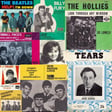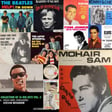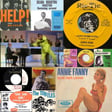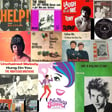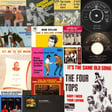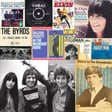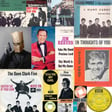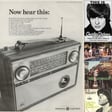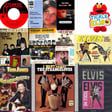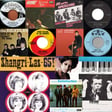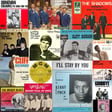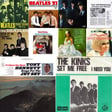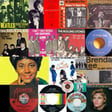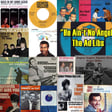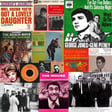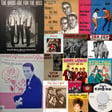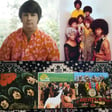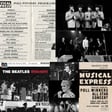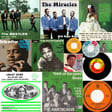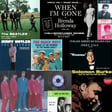Become a Creator today!Start creating today - Share your story with the world!
Start for free
00:00:00
00:00:01

May 1965 (side A)
We are joined by Billy J. Kramer as we discuss his recent album, his upcoming tour through the UK, and his history with Brian Epstein, The BeeGees, Harry Nilsson and more. We also manage to run through the entire British charts for May 1965! Support this podcast at the $6/month level on patreon to get extra content! Create your podcast today! #madeonzencastr .
Recommended
Transcript
The Beatles' Resilience and Charm
00:00:00
Speaker
The Beatles had this charm, John Paul and George and probably then Stuart and Pete, had this charm when things weren't going well, which in their world wasn't very often because mostly it was an upward trajectory, but nonetheless, sometimes you they would have a bad night or the gig didn't work properly or the amps broke or whatever.
00:00:19
Speaker
i say, where are we going, fellas? And they go, to the top, Johnny. And I say, where's that, fellas? they say, to the toppermost or the poppermost. And I right. And we'd all sort of, Cheer up.
00:00:31
Speaker
Where are we going, Johnny? Straight to the top, boys. Oh, yeah? Where's that? The topmost of the poppermost.
00:00:58
Speaker
Welcome to May of 1965 here on Toppermost of the Poppermost.
Billy J. Kramer on His Last Hit Single
00:01:04
Speaker
I'm Ed Chan. I'm Kit O'Toole. And I'm Martin Quibble. Kit and I sit down and chat with the one and only Billy J. Kramer, in part because this is the last real hit single we're going to see from Billy for a good long while coming up this month on the British charts.
00:01:24
Speaker
He talked about his experiences recording, working with Brian Epstein, and how John and Paul attended some of the recording sessions of the songs he did, the one in McCartney wrote.
00:01:36
Speaker
He also talks about little children and why he thought as soon as he saw the lyrics and that it was going to be a hit. So that was interesting to discuss.
00:01:47
Speaker
yep I find it interesting that other people that he worked with that he mentioned in the 60s, he name-checked Mick Green out of Johnny Kid and the Pirates, for instance. That sort of made me think, oh, right, okay, so there were already links between the Beatles world and Mick Green back then.
00:02:04
Speaker
All right, let's go into the interview and we will chat just a little bit more on the other side. We have a very special guest.
Recording at Abbey Road and Nostalgia
00:02:14
Speaker
We're so excited to talk to him about his new album, his wife as a pop star in the 60s, his days with the Beatles on the charts. And also I want warmly welcome to the show Billy J. Kramer. Billy, thank you so much for being with us.
00:02:33
Speaker
My pleasure. It's it's really an honor for us to talk to you. First, why don't we talk a bit about your new album, which you recorded at Abbey Road. We had my 80th birthday party.
00:02:44
Speaker
I did a show there, Studio 2, and then we recorded the album there. Very exciting time. You know, it was very yeah emotional going back there. What was it like being back in Abbey Road after all this time? It was very emotional it to to sort of be on the spot. think to myself, this is where I sang, you want to know a secret?
00:03:03
Speaker
I'll keep you satisfied from a window. I call your name. I'm in love. Trains and boats and planes, little children. It was like, wow. It was a bit of a fantasy, you know, going back there.
00:03:16
Speaker
now you recorded there, what, about 10 years ago for your last album, what, I Won the Fight? No, I Won the Fight was recorded in New York. Funny enough, I did some tracks for EMI in 1978, but I didn't record them at Abbey Road.
00:03:33
Speaker
Lawrence Duper played on them song, you know, back in 78. So is that where you got to know Lawrence from? Lawrence, of course, produced or co-produced this latest record. Lawrence and Jeff Perholtz produced a new album, Are ma You With Me?
00:03:47
Speaker
But I met Lawrence at studios outside of AMI. I've worked with Lawrence quite a bit doing shows and things, so know him very well, you know. Yeah, from all the fasts, for sure.
00:03:58
Speaker
yeah and Steve Hawley is on this new record, correct? Steve Hawley played drums on on some of the tracks. So what was your goal and in recording the album? Was there a particular theme that you wanted to get across, or what were your objectives going into this? I never thought of it as a theme.
00:04:16
Speaker
You know, ah just wanted to make an album of good songs, well-recorded, well-songed. Let's face it, I'm not a trendsetter. I never was. I don't try to be, you know, to me, I just like to, you know, I like to get good songs and do them well.
00:04:32
Speaker
It's what I enjoy doing. Absolutely. and And I just want to mention, i love your cover of Jealous Guy.
00:05:10
Speaker
Well, thank you so much. yeah It's song that I've featured in my show for quite a number of years now. It started off when I was doing B.B. King's in New York. and It was John's birthday, and I did it there.
00:05:21
Speaker
it was very well received, and so I've always kept it there. You know, it's a special place in my heart. Why Jealous Guy? I mean, it's a great song, but was there a particular thing that drew you to it? think you saw it. It's a great showcase song. That's why I chose it.
00:05:36
Speaker
It's a beautiful song. On this record, you have a song dedicated to Brian Epstein. So why don't you give us some of your memories of dealing with Brian personally, and then also Brian bringing on the Dakotas. Your original backup band was the Coasters, but not those Coasters.
00:05:53
Speaker
Well, it came about that what happened was Brian approached me about turning professional. Obviously, I was very impressed. I'd seen the great job he was doing with the Beatles, and I decided that I would
Influence of Brian Epstein and Hamburg Experience
00:06:05
Speaker
give it a go professionally.
00:06:07
Speaker
And the guys in my band, Coasters, they had other professions and they didn't want to take a chance. The Coasters were already an established band that Brian used to use when he used to bring artists to the north of England.
00:06:22
Speaker
They would do the backing jobs. And he thought it would be a good idea. So we got together, funny enough, at the Cavern. with John and Paul and we did a rehearsal and we took it from there.
00:06:33
Speaker
That's how that came about. One thing that you've talked about a bit, you played in Hamburg. I played in Hamburg. I went to to Hamburg with did the coaches when I turned professional. It was Brian's idea that we go there because you had to play long sets.
00:06:48
Speaker
and many sets, and they wanted us to to get it together, to work together with them. but That was how that came about, you know. You've talked in past interviews how Hamburg really helped both you and the Beatles to really kind of refine your skills and so forth. What affected those ruling shows? You're putting in your apprenticeship.
00:07:10
Speaker
When you're playing from four in the afternoon to four and five the next morning, you know, it's a lot of practice. I want to go back a little now. He asked me about the song, Couldn't Have Done It Without You.
00:07:21
Speaker
The song came about by, andm I'm very friendly with Mark Hudson. And we'd chosen all the songs we were going to do for the CD at Abbey Road. And then about a week before, Mark said, you know, we were talking about a song, Billy. And I said, yeah, Mark.
00:07:37
Speaker
He well, I've done it. So i said, send it to me. So he said it to me. And I thought it was such a good song. and it was a real tribute to Brian Epstein. I just had to do it and include it on the CD.
00:07:48
Speaker
Very touching. It was such a personal kind of song. Okay, so when was the first time you were in the studio with George
Recording with George Martin and Song Surprises
00:07:56
Speaker
Martin? I did a test with George Martin of the song, Do You Want to Know a Secret, before the Beatles had recorded it.
00:08:02
Speaker
I was surprised when he called me and said he was going to release as a single. I'd been doing the song at the Star Club ten times a night, and I'd been doing it on any shows. And it wasn't getting any great responses, but bottom line is that, you know, George, he just said that if he thought it was great and decided to put it out. And it took me by surprise when it became a number one hit.
00:08:22
Speaker
Really? Yeah. Very surprising. Wow. Well, it had such great pop appeal, you know, a great vocal on it. I'm not surprised at all. but They chose not to put it out as a single at the time. So, and that may have been because they had already offered it to you.
00:08:38
Speaker
I'll be honest with you. The first thing I knew... About them recording it was when that first album came out. The only thing I'd heard was an acoustic version with John Lennon on an acoustic guitar.
00:08:50
Speaker
That's amazing. So how did songs come to you? Who chose the songs? Who brought them to you? How did that process come about? You know, I was doing a tour with John Lennon and with the Beatles.
00:09:04
Speaker
And John came up to me and said he'd written a song bad to me. And then I happened to be in the studios that they came in. It was bad to me. i call your name. Then they came in with I'll keep you satisfied.
00:09:17
Speaker
And then I went out I picked up the song Little Children, which which was a more human song. and And then they came back with ah From a Window. which I recorded.
00:09:28
Speaker
And Trains and Boats and Planes, which was a hit for me, was a Burt Bacharach song that I'd seen him do on a TV special. And I got together with the guitar player had at the time, Mick Green, and they came up with ah a version. His was a choral version.
00:09:44
Speaker
And we came up with ah an arrangement that suited us. I wanted to ask a you know, Bert Fackrack and Hal David, every time I've heard them, I've thought, you know, wow, these are challenging to sing. They're always kind of unusual chord changes, tempo changes, so forth.
00:10:00
Speaker
So how did you approach singing that song? I mean, did you think, wow, there's some difficult things in here? Mick Green was guitar player. He played it on Paul's Kevin album. and Mick was like ah this guy that everybody rated. and He never made solo albums and things, but I think he influenced every guitar player in the 60s. I was at his house and we tied up very late at night, but just with an acoustic guitar, and worked out how we could do it. I sang the melody to the song.
00:10:34
Speaker
And then I did ah a harmony, a low harmony. and And that's how we went about it. It was pretty easy for me to put it together. bit challenging because we didn't have a lot of tracks at the time and we didn't have some of the instruments available.
00:10:48
Speaker
So we did a lot of playing around with detuning guitars. We didn't use a bass. We used a detune guitar. There was little embellishments that we used other instruments on.
00:10:58
Speaker
And also Mick played mandolin solo with unbets. but version. It was just a string version. We just used a mandolin and George Martin did a string arrangement.
00:11:11
Speaker
you know I was just really curious about your vocal approach. I would say that it wasn't challenging to me. It was challenging to The musicians and George Martin, you know.
00:11:23
Speaker
ah Did George Martin do many other string arrangements for you, or was this the first time that you used it? It was the first time you used strings with me, but then I did some album things that George did arrangements on.
00:11:35
Speaker
That would be later on in the 60s? It was later on, yes. It was mostly album things he he did strings on. So since we're bringing up strings, there's a famous story about Paul playing yesterday for you and offering it to you. Tell us a little bit about that.
00:11:50
Speaker
I was in Blackpool. I went to see them at the ABC. I believe i'd never it was the first time I ever asked them for a song. And I went to the theatre, the ABC theatre, and Paul sat there and played me yesterday.
00:12:03
Speaker
And at the time, I said, I want to rock a rock and roll song. ah told you it was just It was just after Trains and Boats and Planes, so I didn't want to do another ballad. Wow, that's amazing. like We already talked about ah one song, but I wanted to ask you about some others that, of course, we've talked about on our show many times.
00:12:23
Speaker
I call your name, your version of it. The Beatles version you know it has that unusual ska part in it. It's, I think, one of the more unusual kind of songs.
00:12:34
Speaker
How did you go about recording that? I recorded, I call your name, a year and a half before the Beatles. And and what happened was I yeah i was recording bad to me ah and Studio 2, and it wasn't coming together.
00:12:50
Speaker
You know, we were very limited to how much time we had. And I said, let's go to the backside and get that together first. That to me wasn't working out. We did that to me in about 20 minutes.
00:13:03
Speaker
I said to George Martin, let's put that, why I call your name out. And we'll go back to that to me. And he said to me, you sound too much like the Beatles. and i said but I said, that can't be a bad thing.
00:13:17
Speaker
He says, no, you're Billy J. Kramer. We broke for lunch. We came back. And that to me came together. So in the UK, it was that to me and I call your name was the single.
00:13:31
Speaker
That's how that came about. Interesting. And i noticed that, i mean, when the Beatles did it later, they added that ska section. and on and And your version wasn't exactly ska, but you definitely played around with speeding it up a little bit in the bridge. The only thing that was done to it was George Martin did a rundown on the piano ah where they slowed the track down and he did this rundown and then spit it up. That's what they did there.
00:13:58
Speaker
Oh, wow. Okay. I wondered how that came about. So fascinating. So shortly thereafter was your trip to America with Brian. What exactly was going on there? That's always confused me a little bit. I know Brian was certainly there to get the contracts for the Beatles on the Ed Sullivan show.
00:14:17
Speaker
But what was the point of you being there? At the time, Brian thought that I had the right image for the United States. And I went and I did some promotion there. There was a big time promotion.
00:14:28
Speaker
I think he was obviously checking out things for the Beatles. I think that Rock and Roll was in a mess at the time. you know Well, it wasn't. that It was going through one of them periods.
00:14:39
Speaker
I mean, the the the number one record at the time was Tommy Kangaroo Downsport. So that shows you the mess it was in at the time. but That's what happened there.
00:14:51
Speaker
That's funny that you mention that. We've talked a little bit about that, well, more than a little about it on our show, about how the charts and the sounds changed over time. So you just mentioned rock and roll being in a bit of mess at that point.
00:15:05
Speaker
What do you think were the main factors that changed from the novelty records to the British invasion? You don't have to really...
00:15:15
Speaker
think about it the beatles came along they were unique they had great songs and they grabbed the business by the scruff of the neck and shook it up opened the doors for me and a lot of other people that's what happened it just changed the whole sound Well, it changed the whole sound.
00:15:31
Speaker
It changed the business. British rock and roll became, except people have been to America and failed. Cliff Richard, who's had more hits than the Beatles even, came to America in 1958 with great record, rock and roll record movie.
00:15:47
Speaker
And it didn't happen, you know. So that's why there's been a lot over the years about the Beatles. But, I mean, the Beatles opened the door for all of it. ah You've also previously mentioned that right around this same time, you had two Jackie DeShannon songs, Needles and Pins, which of course would go on to be a big hit for The Searchers.
00:16:06
Speaker
And when you walk into the room, two parts to this. A, did you have any relationship with Jackie DeShannon, either as a musician or as a songwriter? or And then B, how did these songs get to you at that point in time?
00:16:21
Speaker
I was in America with Brian Epstein. I met an arranger producer called Jack Nitze, who was producing Jackety Shannon. He gave me the two singles, Needles and Pins and When You Walk in the Room.
00:16:34
Speaker
And when I got back to england England, I started playing these songs and I thought to myself, these are hits. I played them to the Dakotas. They didn't see it the same way as I did.
00:16:45
Speaker
So we never got into them at all. I wish we would have done, but unfortunately, that's what happened. Wow. They didn't think they were hits. Wow. They were very indifferent about they didn't want to play the songs.
00:16:58
Speaker
That was all through Jack Nishi. That's interesting because he's one of our favorites to talk about on the show. Yeah, we've run into him many times. I wanted to ask, too, about the Tammy show.
00:17:10
Speaker
What an amazing experience that must have been for you. What was it like to be there and and perform? Very exciting to have the experience of working with so many people.
00:17:22
Speaker
that you'd admired and being a fan of. To work with all these people, it was just just an amazing experience, you know, to work with James Brown and Marvin Gaye and Chuck Berry.
00:17:33
Speaker
These were people that I idolized as a kid growing up, you know. Sure. It was just very exciting. Talking about James Brown, did you get to see his performance? I stood in the wings and watched it, yes, and it was amazing.
00:17:46
Speaker
Oh, so jealous. That must have been amazing. And you said you met these people that you listened to. and all Was there a feeling of camaraderie with everybody? Absolutely. They were all amazing people.
00:18:00
Speaker
We shared the dressing room with James Brown and the famous Flames, and they were just great people. Wow, that's amazing. and Had you run across the Rolling Stones before, or was that the first time?
00:18:13
Speaker
I'd worked with the Rolling Stones on some BBC sessions in London and on a couple of gigs. And what was it like? We were all at the start of our careers.
00:18:24
Speaker
It was very exciting for all of us, you know. then Wow. I also wanted to ask about I'll Keep You Satisfied, which is such a great track. And John Lennon, as I understand it, was there ah when you were recording it? John Lennon was there when I did.
00:18:42
Speaker
Bad to Me, is it I Call Your Name, I'll Keep You Satisfied from a Window. He was there for most of the songs. Oh, my goodness. Okay, i didn't realize it was that bad. And then there's a song called I'm in Love, which John Paul came into the studio with one day.
00:18:57
Speaker
We never finished that song, but that was another one. that they say They came a lot. I'm very grateful
Choosing 'Little Children' Over Lennon-McCartney Songs
00:19:03
Speaker
to that. Did they give you guidance? How much did they participate They gave me some, not a lot guidance. They mostly just sang them and I learned from what they told me, you know.
00:19:14
Speaker
So tell us what you remember of Little Children. It was a song written by Mort Schumann and Matt Farland. And it was a song that I picked up myself.
00:19:25
Speaker
I remember that music. And the other songs I had, including the Leonard McCartney songs, I thought that Little Children was the best out of them. In fact, the songs the Beatles were presented And they admitted themselves weren't as good as the prior ones. And that's why I went ahead and recorded Little Children. What was it about it that made you think, wow, this is a hit? You were right, obviously.
00:19:49
Speaker
Funny enough, I was just doing it on the cruise. yeah Terry Sylvester, who's with the holly, said I would never get away with it in today's world. It wasn't the lyric about the song. The thing that attracted me about Little Children was the structure of the song.
00:20:04
Speaker
You know, most songs, I feel like they'll start with a verse or two verses and it'll go into the bridge, the chorus, or it can start with the chorus and go into the verse. Little children...
00:20:15
Speaker
was different all the way through the way the song was constructed. And that was what attracted me to the song. It was different in that way. It changed all the way through. There was different segments to it.
00:20:26
Speaker
That's what appealed to me. And I thought, that's that's different. You know, when you're making records, you're trying to find things that are a little different. And that's how I felt about it. And you did Little Children on the Midnight Special in 1973. I can't even remember doing It's you along with the Bee Gees and Jerry and a number of other British invasion acts from the time.
00:20:48
Speaker
I remember doing it, but I don't remember a lot of it. So I'm starting to go. ah Understood. Another single that I was curious about is It's Gotta Last Forever, which was a ballad for you. And it was co-written with Kenny Lynch. And Kenny Lynch has been somebody we've come across quite a bit in our show. And we've really become big fans because for whatever reason, he wasn't as successful in America.
00:21:14
Speaker
Was he part of recording the song? I happened to be in the studio, studio too. Kenny wrote hits for other people as well as writing that song, It's Gotta Last Forever.
00:21:26
Speaker
An interesting interesting single, which I've only dug up recently, was The song I did with the Bee Gees before the Bee Gees were known was Town of Tuxley Toymaker. Brian Epstein, when I finished with EMI, asked me would I like to make a record with Robert Stigwood, who had the Bee Gees. know, it was before they took off.
00:21:43
Speaker
The first time I did something with an orchestra and the Bee Gees, and I've done it a couple of my shows recently, and it's amazing that it wasn't a hit, but it it goes down very well. It's worth checking it out sometime.
00:21:56
Speaker
Town of Tuxley Toymaker Part 1. Do you have any particular memories of Robert Stigwood? He's kind of, at least to us, as on the Beatles side, someone that the Beatles didn't want to work with.
00:22:08
Speaker
I didn't have that much to do with him. I just got together with him and went over songs. I recorded Town of Tuxie Toymaker. That's funny enough, the follow-up to Town of Tuxie Toymaker...
00:22:20
Speaker
was 1941, the Harry Nielsen song on I did, before anybody had discovered Harry. We were going to ask you about that. Talk about working with Harry Nielsen. I didn't work with him. I went to Arsene Publishing one day because I was searching for songs, and they presented me with 1941, which I thought was a great song, and I recorded that.
00:22:42
Speaker
I got together with an famous arranger, Johnny Arthie, And a a guy called Jimmy Duncan and I produced the record together. A beautiful song. I mean, at at that point, Harry was largely known just for his work with the Monkees, right, Kit?
00:22:57
Speaker
I think so. It was before the Monkees. It was before he was known all. Oh, it was even before Cuddly Toy and all that then. Oh, wow. So early. Okay. yeah Even earlier in the curvoid. That's amazing. like Do you have any particular memories of being on the Ed Sullivan show in June of 1964? I just remember sort of being...
00:23:16
Speaker
I programmed myself to Freud. You know, I just thought there's going to be 17 million people looking at me, and that's a bit of a frightening thing.
Performance Nerves on the Ed Sullivan Show
00:23:25
Speaker
I remember just going there. I did the rehearsal.
00:23:28
Speaker
And funny enough, I got back just in time to go on. I'd done other shows where I was a bit nervous, didn't do so well because of that. I was see determined to make a go of it and that's what I did.
00:23:39
Speaker
Wow. That's ah interesting, because I know Paul McCartney has told the story many times about just before he stepped on the stage, somebody said, well, you know, there are over 70 million people that are going to be watching you right now. and it's That's scary.
00:23:53
Speaker
Yeah. that's Yeah. so Which is why John Lennon liked to respond. to Well, that looks like just one fellow with a camera there to me. Yep.
00:24:03
Speaker
But on Sullivan, you did Pride is such a little word. It was a song that, funny enough, I i was on my first album. That was a song I used to do live in concerts, and it was very well received. So that's why I did it.
00:24:17
Speaker
but Fascinating. And of course, you're still out there performing today. And are there songs, the all the hits you've had, that you particularly enjoy playing today?
00:24:29
Speaker
To get the chance to perform these things, i enjoy them all. That's being honest with you. I'm very lucky that I say to people, it's something that I like to do.
00:24:39
Speaker
It's not a job. It's something that I enjoy doing. And it shows. Thank really does in your performing. Absolutely. Talking about performing, your special guests at many Fester Beatles fans, those who listen who don't know, are there particular memories?
Community at the Fest for Beatles Fans
00:24:55
Speaker
I've asked with it done it so many times who that The audience at the fest have become like a family.
00:25:02
Speaker
And when I go back there, it's like seeing a family and friends. And they all interlock with each other. It's just a nice feeling. oh you It really is. And it's great seeing you up there performing you know with Liverpool. And the audience always responds.
00:25:19
Speaker
I'm very aware of that. I enjoyed doing the fest. I really do. Yeah. And you get to play with Lawrence at the fest. What about two people that we have just lost fairly recently in the Beatles world? Joey Marland and then Denny Lane.
00:25:35
Speaker
Very tough. It's very tough. These are people I've known many years. I've worked with, and I'm going to be honest with you, I really don't like to talk about it that much.
00:25:46
Speaker
They're just like the part of my family I am, you know. It's very sad. People. and And that's it. Perhaps happier times then? Any particular memories?
00:25:57
Speaker
I try to think of the good times. I really do. Joey was a unique person, talented person. He was a lot of fun. Loved him like a brother. Teddy Lane was a very talented man.
00:26:10
Speaker
i really respected him and liked him. It was a pleasure to work with these people. It's sad. It's tough. And we lost both of them sooner than we would have liked, for sure, but sooner than we might have expected as well. Yeah, absolutely.
00:26:26
Speaker
So what are your next steps? You've got this terrific album out. You're still playing. So what's is next for you? Don't really know. well you I had a great record out last Christmas.
00:26:38
Speaker
Christmas kind of feeling. I recorded that in Nashville with Tom Helmbridge. and I'm just trying to think of where to go next. I'd like to do some more work with the Newbies.
00:26:51
Speaker
They're great band. They backed me on the cruise. You know Jeff Pertholtz and his wife, Misty. I'd like to do some more work with Jeff. I'd like to do some work with Tom. I'm doing a show with the Yardbirds.
00:27:04
Speaker
I'm at Des Plaines, Des Plaines Theater. Yeah. I'm on April 18th. Love that. I've been trying to get up there for that. That sounds like a lot of fun. I'm looking forward to doing that. It's going to be a great night.
00:27:16
Speaker
We did have one question from our other co-host, Marv Martin-Quibbell. He wanted to ask you about the Kramer vs. Kramer album. I have not had the pleasure of listening to it, but it certainly sounds interesting, and I love the title of the record. Yeah.
00:27:32
Speaker
Well, it seemed like a good idea at the time. I'll be honest with you, I recorded that song and there was a lot of legal hassles about it. So I don't think there's many copies out there.
00:27:43
Speaker
You I'll be honest you, I remember going into a studio and and doing the songs. But that's about it. You know, it kind of gets got dropped. I think it's a rarity if you've got a copy. We went looking for it and could not find a copy.
00:27:56
Speaker
Yeah. Right. The B-side of the album was ah new versions of some of your old hits. Was that just for legal reasons, or did you actually rearrange them in any fashion? I will tell you the truth. Back then, there was it would seemed like a trend where they wanted you to do the old ones.
00:28:13
Speaker
I wasn't in favor of it because I thought that you could never ever get them as good. There was a certain magic to the originals, and I wasn't really happy about doing them.
00:28:24
Speaker
And that's ah that's why I don't think I got behind that album, because of that reason. I rethought the whole thing. but thought to myself, you know, I've made a mistake here. But you're right. That was a time when a lot of people were yeah redoing their, they're rerecording their hits. And and and and also, so you know i you know, I live in the Chicago area.
00:28:42
Speaker
I'd like to start doing a lot more shows in the Chicago area so people know about me. Love that. i use I use some local guys that I'm doing that the gig and there's plans with. So I'm looking forward to it.
00:28:54
Speaker
That's great. Yeah. And there are so many great venues here that you could play. That's fantastic. Yeah.
Return to Liverpool and Reflections
00:29:00
Speaker
And then you're on your way back to the UK before too long, at the end of this month, I believe. Tell us how that tour got arranged, and are you looking forward to playing some of those places again?
00:29:10
Speaker
i'm looking forward to it. always look look forward to going home to Liverpool, you know. That's going to be great. You know, I still have a brother and sister there. and still have a lot of friends there, so, you know, I always have a good time.
00:29:22
Speaker
Fantastic. All right, Kit, do we have anything left, or are we just about done here? I think we're just about done, but I guess I just want to say, you know, it's been pleasure talking with you and hearing about your experiences and, you know, learning more about your songs and, you know how great it was for you to be part of this important era of rock and roll where things really changed.
00:29:48
Speaker
Well, thank you very much. Pleasure talking to you. I'd like to thank you. I've enjoyed talking to you that Maybe I'll see you this place. I know. Yep. I would love to come. and And we'd love to have you back on the show and as we're moving along in and the timeline and the chart.
00:30:05
Speaker
Yeah, now is actually a good time because we are just getting ready to get into trains and boats and planes. Yeah. Well, this was perfect timing. Great talking to Thank you very much.
00:30:16
Speaker
That was our interview with Billy J. Kramer. Before we started, you were talking about Billy talking about Mick Green. I found his chat about Harry Nilsson kind of interesting.
00:30:29
Speaker
Yeah, that he worked with him early on. I mean, really early in his career. Yeah, but didn't you pick up, though, Ed, that the dates were a bit different, though, to what Billy thought? ah Well, first off, if you haven't heard it, his version of 1941 is a pretty close copy of Nilsen's version, which, and you know, we've made some comments about, oh, we're not sure about just how much range Billy had. Billy had some range. He doesn't have Harry Nilsen's range, but he did have some range, and it's a surprisingly excellent version of the tune.
00:31:02
Speaker
Yeah, I do like the vocal that he does on that version of that song a lot. But ah yes, um Billy says this was before anyone knew Harry. ah That's a little bit iffy.
00:31:15
Speaker
Billy's version of 1941 came out in February of 1968. So he had been with the Monkees by that point in time. But, you know, that's all right.
00:31:26
Speaker
Yep, absolutely. And then the other one that we all were really impressed with was Billy did some work with the Bee Gees. Yeah, that shocked me. I had no idea. that was fascinating.
00:31:37
Speaker
And apparently before the Bee Gees were making waves on the charts themselves in the, in you know, outside of Australia as well. And it came up in the interview. Billy was not real excited to chat about it, but I will suggest that you go look for the Midnight Special from 1973.
00:31:54
Speaker
Not only do you have the Bee Gees doing a killer Beatles medley, you have Billy doing Little Children from 1973, along with a lot of other acts that, well, we've talked about on this show.
00:32:06
Speaker
Mm-hmm. Yeah, Jerry and the Pacemakers, Searchers, amazing. All in one show. All right, any more comments you want to make, Marv? I was just interested in, like you said, the amount of people that he interacted with during the 60s and the 70s and in his career. and So did did he meet Lawrence Juba before Paul McCartney did?
00:32:28
Speaker
I think so. i mean, Lawrence and Paul didn't get together until just before Wings, although, I mean, I think Lawrence had actually met Paul as late as the early nineteen seventy s I mean, they were all around in the same studios at the same time.
00:32:45
Speaker
But Lawrence and Billy worked together before Lawrence worked with Paul and Wings, though. I would agree to that to pull in something from Fab. Billy got there first. Yeah. I wonder if Kit knows what what we're hinting at there. ah No, I don't.
00:32:59
Speaker
George Harrison played with a number of different members of Wings well before they were in Wings with Paul. o Okay. And he played with people who'd played with John before they played with John as well. So the joke is, oh, George got there first.
00:33:17
Speaker
I gotcha. So listen to Marv and I chatting about that over on When They Was Fab. Since we are in the plugging mood, it's time for us to bring up our sponsor.
00:33:29
Speaker
Once again, for the third year in a row, we are being sponsored by the Magical Mystery Camp. So, all right, Marv, why don't you why don't you tell us about the Magical Mystery Camp a little bit?
00:33:41
Speaker
Okay, so do you love the Beatles? Are you ready to kick off your summer in the right way? Music Masters Collective, the Fab Faux and RPM Music School are delighted to bring you the Magical Mystery Camp.
00:33:58
Speaker
Join us this June 2025 the breathtaking Full Moon Resort in Big Indian, New at the breathtaking full moon resort in big indian new york for the Magical Mystery Camp, a one-of-a-kind musical vacation exploring the music of the Beatles.
00:34:16
Speaker
Hosted by the FabFo with special guests Peter Asher, Joan Osborne, Steve Forber and more, this all-inclusive event offers nightly performances, interactive workshops, jam sessions and plenty of opportunities for relaxation.
00:34:34
Speaker
Whether you're a musician or simply a fan, join a vibrant community to celebrate the magic of the Beatles music. Dive into workshops, write songs, stargaze, swim, or take in the breathtaking beauty of the Catskill landscape.
00:34:51
Speaker
This unforgettable experience is crafted to refresh your spirit and ignite your creativity. Need a little help from your friends? Music Masters Collective also offers a scholarship program to make this experience accessible to more music lovers.
00:35:07
Speaker
Bring your instrument, or just your good spirit, and prepare for an unforgettable journey. Magical Mystery Camp, where music, fun, and inspiration collide. Register today at www.magicalmysterycamp.com slash toppermost.
00:35:25
Speaker
All right, so we start with the week of the 28th of April to the 4th of May. Kit, why don't you kick us off? Okay, so we first have it. Number one, Ticket to Ride, which will stay at number one for two weeks, then go down to number two, and then number three.
00:35:43
Speaker
Number five, a song we've talked about before, Pop Go the Workers by the Baron Knight. Number five this week, then go down to six, then eight, then ten. Thank goodness it's on the way down. Yes.
00:35:56
Speaker
yeah It's not not a favorite of ours. Number seven, Bring It On Home To Me by The Animals. At number seven, then it will go down to eight, then back up to seven, and then number 12.
00:36:08
Speaker
And we should mention this was on Thank Your Lucky Stars, which we had as a feature a couple months back because it was the Beatles final appearance taping Thank Your Lucky Stars. We'll a couple of those songs in the charts.
00:36:20
Speaker
I guess Thank Your Lucky Stars actually did help the promotion of these songs that was taped at the end of March, aired at the beginning of April. And here we are in May. And many of these songs are in the charts.
00:36:32
Speaker
Indeed. At number eight, we have Concrete and Clay by Unit 4 plus 2, which would then go to number 13, then down to 19 and 25. Number nine, one of my favorites, Catch the Wind by Donovan, will stay at number nine for two weeks, then down to 14 and then 16. And to and on ah At number 10, we've got The Brilliant Stop in the Name of Love by The Supremes, which will go from 10 to 12 to 16 to 21.
00:37:03
Speaker
Then we've got For Your Love by The Yardbirds, number 11 to number 18 to to Then at number 12, we've got The Last Time by The Rolling Stones, which will go from 12 to 19 to 24 to 28.
00:37:17
Speaker
Number 13, The Times There Are a Changing by Bob Dylan, which will go from 13 to 16 to 20 to 22. Then we've got number 14, True Love Ways by Peter and Gordon, which will go from 14 to 5 4 2.
00:37:35
Speaker
Also on that episode of Thank Your Lucky Stars. Yes, I was about to say, those are better songs than we're going to get for this month ahead, by the way. Yes, for sure. And at number 21, I'll Be There by Jerry and the Pacemakers.
00:37:49
Speaker
which will go then to number 25, 35, 46, and then goes out of the charts. At number 22, It's Not Unusual by Tom Jones, which will move from 22 to 28 to 36 and out of the charts.
00:38:07
Speaker
John Lennon's probably happy about that. The unicorn song. yeah At number 26, Wonderful World by Herman's Hermits, which would move from 26 to 14 to 11 to 7.
00:38:21
Speaker
It's an alternate take on that Sam Cooke classic. They omit a verse and they take the song up tempo. It's not a bad version, but it's really not great either.
00:38:32
Speaker
Peter Noon is still just singing way too cutesy. And it doesn't take advantage of his range or even his vocal agility. Mrs. Brown is not as good a record, but it's probably a better single.
00:38:46
Speaker
Low hit. I remember hearing this all the time on oldies radio and the original Sam Cooke is way better. This is a different take. It's definitely popular sound. Sped up.
00:38:59
Speaker
Don't know much about history. Don't know much biology. Don't know much about science books.
00:39:09
Speaker
Don't know much about the French I took. But I do know
00:39:24
Speaker
It's cute, as you mentioned. Peter Noon definitely has ah the cute factor here. But it wasn't too cute for me. It wasn't enough that it killed the record.
00:39:36
Speaker
It's solidly arranged and recorded, I think. I mean, the mix is nice, nice and clear. It's kind of a classic Mersey Beat sort of makeover of the song. And I'd rate a little higher, but definitely not as good as Sam Cooke's.
00:39:52
Speaker
Jimmy Page is on this. I can see why they chose the song. Pete being a school kid technically, but to me it just destroyed the heart of what is a great soul song.
00:40:03
Speaker
A quote from my other half Louise on this, she says it's got no soul, they're just singing it with no feeling or depth, and you don't feel the same emotion that you do with the original by Sam Cooke, in her opinion.
00:40:17
Speaker
Oh, absolutely. I agree with that. But I think it's got some light pop appeal. But again, i am in no way saying that this is better than Sam Cooke. That's for sure.
00:40:28
Speaker
You're going slightly higher than a low hit, I think. I've got low hit. I don't know, Marv, do you think low hit or even just, you go know, meh or high meh? It's a high-met to me. Okay.
00:40:38
Speaker
So we're all within half a grade of each other, it sounds like. At number 35, Subterranean Homesick Blues by Bob Dylan, which we covered on the U.S. side, which moves from 35 17 to 10.
00:40:52
Speaker
to nine at number 36 love her by the walker brothers which moved from 36 to 33 to 31 to 30 this is a very man and cynthia wilde song originally recorded by the everly brothers and released as the b-side to their single the girl who sang the blues in 1963 This version, not good.
00:41:15
Speaker
It's just way too messy. Again, the instruments and the backing vocals are are all just obscured by the mix. It's Righteous Brothers Light, or well, maybe I should call it Righteous Brothers Heavy.
00:41:28
Speaker
None of the walkers are as strong as Hatfield or Medley as far as lead vocalists. The record relies on precision, and there really is not much here.
00:41:39
Speaker
No!
00:41:45
Speaker
Hold her and show her you care. When her world is blue, see her through.
00:41:58
Speaker
Anytime that she's bleeding, she's bleeding.
00:42:15
Speaker
It should be noted that this was the first time that Scott Walker would be the lead vocalist on a Walker Brothers tune, which probably doesn't mean much because, well, we haven't heard any Walker Brothers tunes to this point.
00:42:27
Speaker
Previously, John Walker had been the dominant vocalist. The song was produced by Vinay and arranged by, guess who? Jack Nishi. Of course. The wall of sound treatment is big problem here.
00:42:43
Speaker
I completely agree. Phil Spector-ish production gone wrong. Way too much reverb on the instruments and voices, which, as you said, makes it sound incredibly muddy. If they had stripped down the arrangement and obviously gotten rid of all that reverb, it might be an improvement.
00:43:04
Speaker
And I agree that the Righteous Brothers were much stronger singers. You know, they were emotional. And I thought that fake-out ending was kind of corny. yeah It ends and then, wait, it's coming back.
00:43:18
Speaker
Listen to the Everly's version. It's a much better record. The song is actually pretty good. Mm-hmm. If you heard me giggling in the background, it's because I just noticed a ah ah note that Ed had put in the show notes.
00:43:31
Speaker
Another chance for Marv to go off on Phil. Yeah, I do that a lot, don't I? And yes, this is not a good mix. ah Good voices, i suppose, but the production killed it and it just didn't grab my attention for some reason.
00:43:49
Speaker
Me too. Yeah. Now, as with the Righteous Brothers, the Walker Brothers are not real brothers. You didn't say. They were formed in Los Angeles in 1964 by John Walker, whose real name is John Mouse, and Scott Walker, whose real name is Noel Scott Engle.
00:44:07
Speaker
With Gary Walker, whose real name is Gary Leeds, joining shortly thereafter. They adopted the Walker brothers' name as a show business touch, even though they were unrelated. So, oh boy.
00:44:19
Speaker
I wonder how many different names they they went through before they came up with Walker. Yeah, good question. ah Take it off. Yeah. At number 39, Something Better Beginning by the Honeycombs.
00:44:32
Speaker
which moves from 39 to 48 to two weeks at 44 before leaving the charts. The most interesting thing about this song is that it was written by ray Davies.
00:44:43
Speaker
Now, we like the honeycombs around here. i mean, remember Have I the Right, guys? Yes. yeah Great song. This, however, is a fairly average record. ah It's maybe a not-so-great drifter's copy or a first cousin once removed of Downtown and Feel an Arrangement.
00:45:02
Speaker
It's likable, but it's not a good song. The drums are sidelined, which you're going to have a drummer, ah powerful female drummer like that, let her show off her stuff.
00:45:13
Speaker
It's decently well produced, but is not anything special at all. Medium to high meh. I agree. This is Ray Davies trying to write straight pop, but it just can't compare to his kinks.
00:45:27
Speaker
compositions. It just doesn't quite work. And I agree, it does sound a bit like the Drifters, like, you know, Save the Last Dance for Me or something like that. It was hard to pinpoint the precise song. Teach a step that I took with you Bought one thing closer to mind
00:46:00
Speaker
Horns and strings are way overdone, almost fighting with the lead singer at times. It has a slight Latin feel in the horns, but other than that, I thought very average.
00:46:13
Speaker
Song with no memorable hook. The Kinks actually did record this, but didn't release it on the album at the time. And that's better than this. This is just not good.
00:46:25
Speaker
And even the singer himself, they sound in this like a bargain basement Gene Pitney.
00:46:33
Speaker
That's true. At number 40, come on over to my place by The Drifters, which we covered on the US side. It moves from 40 to 43 to 46 to 42. It doesn't really gain much traction on the UK charts, although it was featured on Thank Your Lucky Stars.
00:46:51
Speaker
o We move on to the second week, the week of May the 5th to the 11th at number 29. That's why I'm crying by the Ivy League, which moves from 29 to 22 to
00:47:07
Speaker
whiny The organ is poor. Kit, we'll let you have your say on that. Marv can talk about Phil Spector. You can talk about the organ. The harmonies are nice enough, but there is just no real contrast on this record.
00:47:20
Speaker
The mastering is odd as the intensity of this record is all over the place. The volume goes up, the volume goes down. The volume goes up, the volume goes down. And then the lyrics inside.
00:47:32
Speaker
That's why I'm crying. What does that mean? Are you talking to somebody else or is this a self monologue or or what's the point here? Miss? Yeah, I didn't care much for this either. I thought that they at times were trying to almost imitate the four seasons in terms of the.
00:47:48
Speaker
harmonies and lead singer trying to hit that falsetto Frankie Valli-esque like on Ragdoll or something along those lines and can't quite do
00:48:31
Speaker
The organ actually didn't bother me as much as I was fearing it would. It's just okay, though. It's not ah absolutely necessary part. The chord changes are somewhat interesting, but I just think this is a ballad that just, to me, it went on a bit long, too, and really felt it because it just doesn't go anywhere. So, yeah, miss for me.
00:48:54
Speaker
The music and the melody are better than the lyrics deserve. It's like an anthem for people who have got no one left in their lives. So, so sad.
00:49:06
Speaker
o At number 32, Once Upon a Time by Tom Jones, which stayed at 32 for another week and then moved to number 34. Another one, this was what Tom Jones did on Thank You, Lucky Stars.
00:49:19
Speaker
It's a little bit too close to It's Not Unusual.
00:49:35
Speaker
Once upon a time there was an Eden Once upon a time at all that Eve I fell in love
00:49:52
Speaker
Tom is giving a smoother lead vocal than he did previously. The horns are not quite as good and the half fairy tale, half biblical connections don't really work.
00:50:03
Speaker
Low, low hit. Yeah, now this was originally from a musical from 1962 called All American. And it was sung originally on stage by Ray Bolger, of course, from Wizard of Oz, and Eileen Hurley. And you can hear their version online.
00:50:22
Speaker
It's been covered by many, many people. I was amazed at how many. I mean, Eddie Fisher, Bobby Darin, Frank Sinatra, Perry Como, Tony Bennett, Bob Dylan.
00:50:33
Speaker
ah covered this. And I'm a bit confused as to why. I didn't think it was that interesting. The original is very different. It's obviously more of a Broadway kind of style. It's slower.
00:50:45
Speaker
And Ray Bolger's part, he almost speaks the lyrics rather than sings them. And it's just strings and horns backing them. This, I thought at times Tom kind of overdid it.
00:50:56
Speaker
He's giving it his all, but it almost borders on campy for me. I mean, he just really oversings at times, trying to infuse energy into it.
00:51:07
Speaker
And I agree that the arrangement sounds a bit like it's not unusual. That is not all the original sounds at all. So obviously Tom Jones has a great voice, but I just didn't think this really suited him at all.
00:51:20
Speaker
Tom's voice is okay. You can't diss the voice of Tom Jones, but the song just didn't hit the mark. It seemed like a redo. We're all in agreement. Yep. We'll see whether we're going to agree about this next one.
00:51:33
Speaker
At number 35, That'll Be The Day by the Everly Brothers. which moved from 35 to 30 to 41, cover of the Buddy Holly song, of course. I kind of like this version.
00:51:43
Speaker
I like those Everly Harmonies on it. It's good guitar. It could have used a little bit more life, but it's still a pretty good cover. I would call it a low hit. Oh, boy. um I was not as crazy about it. That'll be the day when you make
00:52:03
Speaker
You know it's a lie, cause that'll be the day when die.
00:52:28
Speaker
I didn't like that beat they were using. It almost sounded like marching or something. Very strange. Too much reverb on their voices, which obviously this is the Everly Brothers. Some of the best close harmony singers ever, and drowning them in reverb is just big mistake.
00:52:45
Speaker
Their harmonies, of course, are always great, but the heavy-handed production and arrangement just overshadows that sound. It's like they're trying to update this to sound a little like harder rocking, but it just doesn't work. It just comes off as plodding. As you said, the energy level was not really there. So definitely low, low hit for me.
00:53:08
Speaker
The vocals are great. I really don't like the musical arrangement. The guitar solo has got a dirtiness to it. I quite liked the tone of that guitar and what they were playing.
00:53:39
Speaker
I get that it's a tribute to one of the heroes, but, and I'm going to get a pun in here, as my other half Louise said about this, for the most part, it's buddy awful.
00:53:52
Speaker
All right, we're on the same page again.
00:53:56
Speaker
And we do have to remind you that, of course, this was the first record that the Beatles or the Quarrymen ever put down. So find it on Anthology. And there are lots of really cool versions of it.
00:54:08
Speaker
One of the ones I like a lot, Pat D'Nizio of the Smithereens did an acapella version of it. That's really cool. Oh, I haven't heard that. Ooh, that'll be the day.
00:54:22
Speaker
that'll be the day.
00:54:26
Speaker
That'll be the day Bow, bow, bow, bow
00:54:34
Speaker
We move on at number 39, This Little Bird by Marianne Faithfull, which moved from 39 to 13 to 6. It's a John D. Loudermilk song.
00:54:46
Speaker
It's got a pretty good lead vocal from Marianne, but it's nothing terribly exciting. Good enough. The backing is a bit saccharine, but not overly so. Low hit, but it's also fairly disposable to my mind.
00:54:58
Speaker
Yeah, I would definitely agree. The sun shines.
00:55:24
Speaker
I do think Marian Faithful turned in a good lead vocal here, but it's very folky, has you know even a harp section, but it just doesn't go anywhere. It didn't hold my interest, let's put it that way.
00:55:38
Speaker
I just think she deserves stronger material than this. musically there's almost a romany feel to it back in the day they used to call it a gypsy feel but i don't know if we're allowed to say gypsy anymore yeah i didn't mind the song as a background piece of music it was okay but like both of you i do like marianne's vocal on this a lot i think this is a really good vocal by marianne faithful yep great And we will be seeing another version of this song before the UK side is out this month.
00:56:08
Speaker
Yes, indeed. Yes. And both of them produced by Andrew Lou Golden. At number 40, The Clapping Song by Shirley Ellis. We covered this on the US side.
00:56:19
Speaker
Number 40 to number 25 to number 14. At number 45, If I Ruled the World by Tony Bennett, which we covered on the U.S. side, which moved from 45 to two weeks at number 43.
00:56:33
Speaker
At number 46, We Shall Overcome by Joan Baez, which moved from 46 to 41 to 26. twenty six Do we have any idea why this was released as a single? At this point in the UK?
00:56:45
Speaker
I have no idea. Didn't she appear on the television show that Bob Dylan did around this time in the yeah UK? Did she? That I don't know. Because I know that Bob was doing some UK stuff around this time in the yeah UK, early 1965. Because footage of him on British television around this time.
00:57:08
Speaker
And I think she accompanied him on that trip to the UK. Yeah. That may well be. it just seems a little bit odd for a what at this point is a three-year-old song. Damn.
00:57:18
Speaker
We've talked around this song before. Vocal and guitar, it's a strong recording. It's a message song rather than a song to be rated. So, well, I'm going to abstain from ranking it, but I will rate it as powerful and needed both when it was written in 1940 and then...
00:57:37
Speaker
and then when released in both 1960, 1965, and even today in 2025. Absolutely. It's as meaningful today as ever.
00:57:49
Speaker
It's an important song. Now, this wasn't Joan Baez's most important performance of the song. She performed it at the March on Washington on August 28, 1963. This version she performed Miles this version she performed at miles college in Birmingham, Alabama, but it was the same day as the mass arrest of civil rights demonstrators,
00:58:11
Speaker
in May 1963. So it's still an important performance, but not quite as major as the March on Washington, always, least in terms of publicity and all.
00:58:23
Speaker
What can you say? She had such a beautiful, flawless voice. Very moving performance with the crowd singing along. I mean, you just can only imagine being there and experiencing it and she just sings this with such conviction just comes through the speakers just beautiful the voice is unmistakable and nobody else sounds like Joan Baez yep beautiful the truth will make us free truth will make free truth will make us free
00:59:13
Speaker
Oh, deep in my heart
00:59:31
Speaker
It's a really nice performance, and I love that the audience get involved in it. It's like a perfect live recording to me. I agree. At number 49, How Long Has It Been by Jim Reeves, which moves from 49 to 47 to 45.
00:59:48
Speaker
Well, I didn't rate We Shall Overcome, so I'm not going to rate this one either. It's another message song. It's more about the message than the song. ah This was written as a hymn in 1956. The record is more of Jim Reeves and it is appropriate in the place and time, but I will say it's probably in the charts only because of the ongoing Jim Reeves morning.
01:00:11
Speaker
sir I agree. And it was recorded in either 58 or 59 and produced by Chet Atkins, who of course produced many of Jim Reeves' other songs. It's kind of a waltz spiritual. it's Interesting change of pace a bit for Jim Reeves, but other than that, i just didn't find it very you inspiring gospel because he has that had that smooth voice, which suited some songs well.
01:00:55
Speaker
How long has it been since you woke with the dawn and felt
01:01:16
Speaker
I actually would have liked to have heard an Elvis version of this song. That would have been interesting, because yeah, yeah he would have infused some more emotion in it. Oh, religious song. um It's alright, he sings well, and Chet Atkins is a good record producer, and It's a religious song, and it's not one of those that's particularly moving up to me.
01:01:38
Speaker
I agree. So we continue with the week of the 12th of May to the 18th of May. Marv, why don't you give us a couple of songs from the top here? Okay, number one, we've got one of Ed's favourites, ah King of the Road by Roger Miller, which goes from number one to number four.
01:01:57
Speaker
Number two, we've got Ticket to Ride, which goes from number two to number three. Number four, we've got True Love Ways by Peter and Gordon, which was one of our standouts from the previous month, going from number four to number two. Number eight, we've got Pop Go The Workers, and they are going...
01:02:15
Speaker
Thankfully, by the Baron Knights going from 8 to 17. I've been wrong before by Scylla going from 17 to 20. And at 23, For Your Love by the Yardbirds going from 23 to 31.
01:02:29
Speaker
So we pick up at number 28 with Poor Man's Son by the Rockin' Berries, which would move from number 28 to number 13. third jean
01:02:41
Speaker
I'll get my pay like the rest when the wind is through Gonna buy you something that pleases you I'm a poor man son No man, rich and poor could ever love you anymore
01:03:08
Speaker
I work my hands, make it to the bar
01:03:15
Speaker
I like the song. It's a little unpolished jam, nice harmonies, nice lead vocal, good guitar. It is kind of a sideways version of Lee Dorsey's working in the coal mine.
01:03:26
Speaker
That becomes obvious when you get that, ooh, ah, backing, which comes in about halfway through. It's not bad, but it's not great. Low hit. Yeah, I didn't love this. I mean, i also thought working on the Chain Gang, oohs and ahs also reference.
01:03:43
Speaker
Yep. It was originally written for a group called The Reflections, which were a Detroit blue-eyed soul singing group. yeah And it was written by Detroit songwriters, not super well-known ones. But I didn't love this.
01:03:57
Speaker
I thought it just sounded very derivative of other... soul songs of the period at the beginning when they were like a son and done that irritated me for some reason yeah and so i just found it never really took off for me yeah so hi meh okay yep i'm with kit on this sort of met i thought it was some background and um yeah i haven't got much more to say about it yeah no no no
01:04:31
Speaker
At number 33, Long Live Love by Sandy Shaw, which would move from 33 to 38. kind of feels like Sandy Shaw doing a bit of Francois Hardy.
01:04:42
Speaker
I like her lead vocal, but this isn't really her style, and the backing is not great. The horn break, which we get on three separate occasions, is just annoying. Otherwise, well, the tune is unmemorable.
01:04:55
Speaker
Wow, you pretty much said what I wrote. Whee!
01:05:01
Speaker
And I don't get home till late I say to myself each day Baby, oh long, long live love
01:05:25
Speaker
Those sudden blasts of horns, like at the beginning, and then it goes into another kind of style. It has a calypso feel. The horns sound a little reminiscent of It's Not Unusual.
01:05:37
Speaker
I just don't think it's that interesting a song. I mean, Sandy Shaw sings it fine, but as you said, it's just not really her style. It never really takes off or has a memorable melody. And I'm baffled. This was a number one hit in the UK.
01:05:50
Speaker
So yeah move it moved up 25 spots in one week. but Marv, tell me, well can you explain why? I actually quite like the song. You disagree with the both of us then? I do.
01:06:02
Speaker
ah Sorry. I can see where you come through, though, with the horn breaks. There's too many of them for a hit single. It could have been shorter because of that. The lyrics could be seen as a bit clichéd, but there's an honesty about them.
01:06:15
Speaker
I like Sandy's vocal. I didn't mind it. I like the message behind the song. It grabbed the basic romantic that I am. There go. Oh, I guess we've gotten too cynical, Ed. Oh, well.
01:06:28
Speaker
At number 38, the next one from Unit 4 Plus 2, You've Never Been in Love Like This Before, which moved from number 38 to number 32. two Nice harmony, vocals, and guitar.
01:06:41
Speaker
Wow.
01:06:47
Speaker
more. Squeeze my hand some more. Loving you, I feel the same, but still you think I'm not too sure. Oh, darling, darling, can't explain the way that I felt.
01:07:01
Speaker
But deep down inside, I'm telling myself that you've never been in love like this before.
01:07:16
Speaker
Interesting lead vocal, particularly the singing up the scale and that never been in love like this before bit. It's a bit Beatle-y, almost to the point of being slightly cliche.
01:07:27
Speaker
Moderate hit. Yep, that's what I said, low hit. You know, it's an okay pop slash rock mid-tempo kind of tune. It was written by vocalist ah Tommy Muller and guitarist Brian Parker, members of the group, obviously. I like it a bit better than Concrete and Clay because I like the guitars in it, the kind of acoustic guitar, but at times driven rhythm and all. But otherwise, was all right. I would definitely say low lowhead Good vocals, got contrasting sections.
01:07:59
Speaker
It's interesting. It's them, much like concrete and clay. It's got that experimental edge to it, I suppose. So, yeah, it's okay. You're also more of a Unit 4 Plus 2 fan.
01:08:11
Speaker
I am, yes. Yeah. At number 39, Ico Ico by the Dixie Cups, which we covered on the U.S. side, which moves from number 39 to number 36.
01:08:22
Speaker
At number 45, When the Morning Sun Dries the Dew by Quiet Five. This is at number 45 this week and out the next. And despite the name of the band, there are six members in the Quiet Five.
01:08:37
Speaker
and But don't forget, Ed, that in the 1980s, we'll have the Thompson twins who had three members. As far as this song, it's slightly Ferrycross the Mersey.
01:08:49
Speaker
Otherwise, it's a boring tune with average lead vocal.
01:09:23
Speaker
Decent guitar and backing that just doesn't go anywhere. Loma, as an aside, look for the Quiet Five press photo. You can hear them telling their publicity guy, we'll get a photographer who can make us look like the Beatles because, well, that's exactly what they do. Yep, that's for sure.
01:09:40
Speaker
I thought that the song had some promise. Very folk influenced. I do like the guitar picking on it ah Pretty harmonies. I just wish the song were A, a little shorter, and B, had a more interesting bridge.
01:09:54
Speaker
And the lyrics get a bit repetitive. So if they had maybe taken some time to do some rewriting of the lyrics, it could have been ah bit better.
01:10:04
Speaker
It was actually written originally for Marianne Faithfull. could see that. Yeah, it was written by ah guitar singer Chris Eif for Marianne Faithfull.
01:10:16
Speaker
And now a tribute to one of our avids, Chris Ife, who passed away at the end of last year. He often emailed us with complimentary remarks about the programme, his 1968 version of the Jimmy Cliff song, Give and Take.
01:10:29
Speaker
was Chris's third single on MGM's then newly formed Music Factory label, where he also released Joe South's Hush to great critical acclaim. But sadly, that elusive hit never came his way.
01:10:42
Speaker
I know
01:11:03
Speaker
Five then ended up recording it and releasing it themselves. One word, boring. Yeah, it needed some work. Yeah, and when Ed said boring, that's why I laughed. That's just what I put up, up boring.
01:11:15
Speaker
Yep. And we do actually have a Beatles connection to The Quiet Five. Look for an article called Take Five to Tell Secrets from the 28th of September 2006, where we learn that The Quiet Five would support...
01:11:33
Speaker
both the Beatles and the Rolling Stones at various points in time. We played with the Beatles at Fairfield in 1962 and the year after. There is no record of the Beatles playing Fairfield in 1962, but they did indeed play Fairfield Hall in Croydon on Saturday, the 7th of September, 1963. Nice.
01:11:53
Speaker
three here So, continuing, their single She Loves You was at number one, and it was just crazy. I remember George Harrison walking off the stage and saying, I'm not bloody going back out there for any money.
01:12:09
Speaker
Well, they were terribly nice, ordinary guys. So, there you go. Wow. Was that a clip of George actually speaking? Yeah, that's amazing. Wow.
01:12:20
Speaker
Uh, no.
01:12:24
Speaker
All right, we move on to the next week, the 19th to the 25th of May. Kit, why don't you give us a couple? All right, so at number one, we have Where Are You Now, My Love by Jackie Trent.
01:12:36
Speaker
Number two, True Love Ways by Peter and Gordon. Number three, Ticket to Ride by The Beatles. And number 19, Here Comes the Night by Them.
01:12:46
Speaker
at number 27, Trains and Boats and Planes by Burt Bacharach. a guitar opening which is very Burt Bacharach. Burt is not singing.
01:12:57
Speaker
Indeed, there isn't really a lead singer in this version of the tune, just a bunch of backing singers. The arrangement and an instrumentation is just easy listening. It really needs some life.
01:13:09
Speaker
I agree. Very bland, kind of comes off more like background music And the lead voices, as you mentioned, are you know sort of a female chorus. I think it would have worked way better, and it did, for Billy J. Kramer, which we'll be talking about later. One voice is better for this song. um Strings galore and horns.
01:13:29
Speaker
I just think overall, there's a bit of twangy guitar in there that makes it somewhat interesting. But other than that, yeah, as you said, an easy listening.
01:13:42
Speaker
Trains and boats and planes while passing by Made me a trip to Paris or, oh, to someone else But not for me The trains and the boats and planes took you away Away from me
01:14:08
Speaker
Not a great version. Unlike Dionne Warwick's version, which is great. Yes. It's not a bad song. don't particularly like the fact that nobody singled out in this version. And for a Burt Bacharach arrangement, I just thought that nothing really stood out in this version particularly.
01:14:26
Speaker
Agreed. I kind of wonder how Burt Bacharach allowed this thing to go out this way. Yeah. Yeah. Good question. at number 29, The Price of Love by the Everly Brothers.
01:14:37
Speaker
It's a bit bluesier, Everly. They're doing a Don and Phil song. The harmonica and somewhat contemporary guitar almost feels to me like the Everly's attempting something between Love Me Do and what Johnny Cash just did with the train rhythm on Orange Blossom Special. Still, I'll give it a hit.
01:14:57
Speaker
Yeah, I thought this was a very interesting change of pace for them. Pretty bluesy, you a hard driving rhythm. wish they'd gotten a better harmonica player, but it was an interesting touch and little bit of a muddy recording.
01:15:10
Speaker
But I appreciate the change of pace for them.
01:15:42
Speaker
Maybe low hit. Yep. Upper mid-tier, Evelies. I like the change pace for the guitars. The bluesy harmonica is okay, but Charlie Musselwhite was around at the time, and he would have been a much better choice for doing harmonica.
01:15:58
Speaker
Oh, for sure. He would have killed it. Interesting drum arrangement for this. And quite frankly, nobody can sing like Phil and Don sing. yep Now, this is another song that Brian Ferry covered on the Let's Stick Together album from 876.
01:16:13
Speaker
And that's a really good version with Chris Spedding on guitar. Very cool. At number 35, the tune which we just mentioned, and in fact we mentioned at the top of the show when we were talking with Billy Jay, Trains and Boats and Planes by Billy Jay Kramer and the Dakotas.
01:16:30
Speaker
There's a bit more Mersey beat in the guitar here. It's a good lead vocal, but Billy doesn't really try anything overly ambitious there. It's not the best George Martin arrangement, but it's not too badly overdone.
01:16:43
Speaker
As Marv noted, i prefer the Dionne Warwick version, and this song is really not top-notch Burt Bacharach. We were so in love and high above We had a star to wish upon wish Given those limitations, this is still a success for Billy Jay.
01:17:08
Speaker
Give it a low hit. given those limitations this is still a success for billie j give it a low hit Yeah, I think we mentioned before, it's Billy Jay's last hit of this period.
01:17:22
Speaker
It was his last UK Top 20 single. It's certainly more rock-oriented than the Burt Bacharach version, although there's still plenty of strings here in the instrumental section. I like it better than Burt Bacharach's version, but overall, they're better Bacharach David songs.
01:17:39
Speaker
I think Billy does capture the feeling of the song better in his vocals than the female chorus did in the original. And it was interesting the way Billy got this. There was a special show being recorded by Burt Bachrach at the Bernada Television Studios in Manchester.
01:17:56
Speaker
And the producer, Johnny Hamp, heard the song, Burt Bachrach's, and arranged for it to be offered to a group who also recorded there, a group called the Four Just Men, who later recorded as Whipple Winch.
01:18:11
Speaker
Interesting. um They turned it down, and so then the song came to the attention of Brian Epstein, who suggested that Billy J. Kramer record it. Well, that's how we got it.
01:18:22
Speaker
Yeah, it's a bit overdone for a George Martin orchestration, but it's not badly overdone. Yeah, it's not to the point where it's offensive. Yeah, I agree with both of you. I quite like what he does on this. It's okay. If it came to the attention of Brian Epstein, I'm sort of wondering why it wasn't suggested for Scylla.
01:18:41
Speaker
Billy does a good version of it, and I do prefer this to the version that Bert himself did with those backing singers. But yeah, like I said earlier, the Dionne Warwick version blows both of them out of the way, really.
01:18:54
Speaker
I don't think it's that much better. I think it's a bit better. but yeah I do agree. It's definitely the optimal version of this song. It's Dion's voice. Yes. At number 39, Marie by The Bachelors. This is an Irving Berlin tune, so this has been around for a while.
01:19:12
Speaker
I don't care for the horns in the opening, and they keep coming back. m The lead vocal is fine, but maybe a little bit too laid back. The harmony vocals are also fine, but they're too chipper and up tempo.
01:19:26
Speaker
A consistent problem with this record. There's a great version of this by Frank Sinatra and Tommy Dorsey. yeah The only problem with that version is the backing vocalists almost managed to upset the combination of a great lead vocal and arrangement, but it's still very good.
01:19:45
Speaker
This one, meh. Mm-hmm. To me, it's just kind of a typical Bachelor's, sorry for the Bachelor's fans out there, treatment of the song. It's a throwback, but not necessarily in a great way. It's a bit corny.
01:19:59
Speaker
Interestingly, when I played the song, my mother was sitting with me and she immediately recognized the song. Not this version, but that it's been recorded, as you mentioned, Ed, by many.
01:20:10
Speaker
Will you surrender to me? Pretty much.
01:20:24
Speaker
Marie, you'll soon be waking to find your heart is empty.
01:20:46
Speaker
by the way. Jim Reeves also did a version of this. yeah I haven't heard it yet, but it's okay. Not offensive or anything, but they just don't do anything particularly interesting with the song.
01:20:58
Speaker
The vocal group, The Bachelors, are doing another one of those songs that harkens back to the and the 50s. It's all right, but it's old out. Yes. At number 47, No Regrets by Shirley Bassey.
01:21:12
Speaker
Let it always be said. We attempted what came.
01:21:40
Speaker
Taken from the French, non je ne regrette rien. Is that somewhere close, Mar? Yep, sounds close enough. You won't offend anybody, I don't think.
01:21:51
Speaker
Excellent.
01:21:59
Speaker
I don't regret anything
01:22:03
Speaker
Shirley Bassey is doing her best, but that's all this record has going for it. and It's too big of an arrangement for a tune that really should be done in a small, heartbreaking, emotional fashion.
01:22:15
Speaker
Low hit. yep We love Shirley Bassey, but I just thought her performance was a little over the top here. And I think mainly because she was trying to keep up with the arrangement, which it was also over the top. This is no Goldfinger. I mean, it's just not a great...
01:22:31
Speaker
fit for her and it was originally by edith piaf yeah i would think her version would be more understated it's good bye
01:23:10
Speaker
This needed to be more understated to work. Well, that's okay. This one didn't win an Academy Award either. so No. Call back. Listen to the last episode of last month.
01:23:21
Speaker
Yes. I think they should have regretted actually doing this. um The Edith Piaf version is the absolute definitive of this. Understated and magnificent.
01:23:34
Speaker
This sheerly is great. And usually the people behind the scenes of this are great. But this is not great. not by any stretch. yeah At number 48, another record which is not great.
01:23:48
Speaker
That's How Strong My Love Is by The In Crowd. This is a really good song. You know that's how strong my love is Oh yeah That's how strong my love is Baby baby This version, it's a bad cover with very strong skinny white boy vibes.
01:24:22
Speaker
this version it's a bad cover with very strong skinny white boy vibes Only average instrumentation. Poor backing singers. Just barely average lead singer.
01:24:36
Speaker
Miss. Come on. Otis Redding. He does the definitive version. This is a poorer version. Well, the Stones version is actually really pretty good. Yeah, so's it's El
Song Criticisms and Comparisons
01:24:48
Speaker
Stone. It's not quite as good as the Otis version, but it's up there. Yeah, but you know this lead singer, as you said, he just doesn't have the grit to...
01:24:56
Speaker
The bluesy kind of feel. At times he even speaks the words because he can't hit some of those ties. This is a boring version. The singer doesn't pull emotions into it like Otis does.
01:25:09
Speaker
The arrangement is not soulful enough either. Just an all-around miss. Everything about this arrangement is a mismatch. Nothing works with each other. It's like different styles mashed up together that just don't do anything.
01:25:26
Speaker
Especially those backing vocals. They're dreadful. Really, really, really bad version. Next. Take it off. Yes. well In order to wash this out of your mouth, we are going to do a supercut of this song. The good versions. The good versions. some of the good versions. This song was originally written by Roosevelt Jameson, who was not a songwriter, but he was a hospital worker. Wow. Wow.
01:25:54
Speaker
It was first recorded in 1964 by Deep Soul singer O.V. Wright. And then, as mentioned, Otis Redding would probably have the definitive version. The Stones would have a close second.
01:26:07
Speaker
And the reason the Stones recorded it was it was a trade with Otis. Otis did Satisfaction. They did this song. Even though it's not an Otis Redding original, it's a song Otis made famous.
01:26:18
Speaker
right so the super cut includes the original original by ovi right the stones the otis redding version the hollies percy sledge cool i'm sorry to say this millie did a version which is not good oh no oh georgie fame and alan price oh that'd be interesting humble pie cool And since Marv was talking about Brian Ferry, Brian Ferry did a version of it.
01:26:46
Speaker
Iggy Pop did a version of it. Oh, really? That'll be interesting. Question Mark and the Mysterians, which I really like a whole lot. It almost sounds like Prince. Wow. And then Martina McBride.
01:26:59
Speaker
Cool. I've not heard anyone mention Question Mark and the Mysterians for years. Yes. They were good. There are Beatle references there as well.
01:27:31
Speaker
Everywhere I feel the moon when the sun go down Just to let you know I'm still around
01:27:49
Speaker
that's strong love you that's strong love you
01:28:30
Speaker
You can go swimming when you are here I'll be the rainbow after the storm is gone Wrap you in my colors and keep you That's how strong my love is baby That's how strong my love
01:29:00
Speaker
I love you, baby, baby That's how strong I love you That's how strong I love you I feel the ocean so deep and so wild I drink your tears whenever you cry And I feel the breeze after the storm is gone To dry your eyes and on the ground
01:29:30
Speaker
That's how strong my love is That's how strong my love is That's how strong my love is That's how strong my love is
01:29:59
Speaker
I love it, sir.
01:30:10
Speaker
There's a strong, my lovin'.
01:30:36
Speaker
Take me apart now, nobody baby Gonna read my heart now Nobody, nobody's gonna mess my mind baby, yeah
01:30:48
Speaker
That's how strong
01:31:15
Speaker
That's how strong my love is.
Different Versions of 'This Little Bird' and New LP Series
01:31:40
Speaker
At number 49, a second version of This Little Bird by the Nashville Teens. Big drums in the opening. The harmonies don't quite seem to be together, although it does get better as the song progresses.
01:31:54
Speaker
I prefer the slightly country arrangement of this one to Marianne Faithfull's version, but I hate to say it, for some reason this makes me think of the Partridge family. I can't really put my finger on just why. I think it may be the harmonies. Well, it is a bird song.
01:32:09
Speaker
Yeah, there you go.
01:32:30
Speaker
He flies so high up in the sky
01:32:38
Speaker
I prefer this version to Marianne's version, but I still don't love it. The best version of this tune came from Jewel. She did an acapella version, which wins by ah mile. Wow.
01:32:50
Speaker
This little
01:33:07
Speaker
The Nashville Teens version, low hit. I agree with what you were saying, Ed. It's not as folky. The beat and the piano parts have a little more rock feel to it. Nice harmonies on the vocals, but the tempo is sped up a bit. But I'm just not crazy about this song. It just doesn't have...
01:33:25
Speaker
a memorable hook for me. It's also the recording, and of course Andrew Lou Goldham produced this. It's a little bit muddy sounding, I think, this version. It's fine. The song itself just doesn't excite me, and this version maybe is a little better than the Marianne Faithful, but not by much.
01:33:45
Speaker
Yep, I agree. Produced by Andrew LeGolden. Same song as earlier, but it'd probably be better if it was an album song. Well, like I say, if you haven't heard it, go listen to the Jewel version. It's gorgeous.
01:33:58
Speaker
All right, so that closes out our look at the British charts for May of 1965. We will be back with the American charts real soon.
01:34:10
Speaker
See you then. Take care.
01:34:26
Speaker
There was a piece in the NME, a news piece that said the top rank records, remember when top rank had a record label? and They introduced an LP series next week that will be called Toppermost.
01:34:37
Speaker
And it's coinciding with their current advertising slogan, Toppermost of the Poppermost. I thought, they got it from somewhere. They saw that, they must have seen that in either the NME or Record Mirror or Disc.
01:34:52
Speaker
Record and Show Mirror, as it was then. And they've taken it from there. They've obviously thought, how stupid that is. How stupid is is one of those phrases that someone, an older person who doesn't understand teenagers, comes up with a slogan that they think is going to be the hip slogan of the month.
01:35:09
Speaker
Toppermost of the poppermost.
